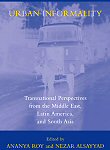

 ISBN-13: 978-0739107416
ISBN-10: 0739107410
ISBN-13: 978-0739107416
ISBN-10: 0739107410
|
The turn of the century has been a moment of rapid urbanization. Much of this urban growth is taking place in the cities of the developing world and much of it in informal settlements. This book presents cutting-edge research from various world regions to demonstrate these trends. The contributions reveal that informal housing is no longer the domain of the urban poor; rather it is a significant zone of transactions for the middle-class and even transnational elites. Indeed, the book presents a rich view of "urban informality" as a system of regulations and norms that governs the use of space and makes possible new forms of social and political power.
The book is organized as a "transnational" endeavor. It brings together three regional domains of research―the Middle East, Latin America, and South Asia―that are rarely in conversation with one another. It also unsettles the hierarchy of development and underdevelopment by looking at some First World processes of informality through a Third World research lens.
This rich and provocative collection succeeds not only in deconstructing the outmoded antinomies of informal versus formal, local versus global, and marginalized versus institutionalized power, but, mirabili dictu, takes a giant leap along the path to fruitful reconstruction. Its strong chapters, written by theoretically sophisticated and research-grounded area specialists with considerable experience in specific urbanized settings in the Middle East, Latin America, and South Asia, not only illustrate common problems but identify variations in response, contingent on differences in their cultural, economic, and geopolitical contexts. (Janet Abu-Lughod, New School for Social Research (Emerita)).
The spread of urban informality is the most significant trend shaping the space and time of our 21st century world. This book is the finest collection of scholarly essays I know on this phenomenon. It should be mandatory reading for courses on urbanization and on development studies. (Manuel Castells, University of California at Berkeley (Emeritus)).
The book presents a rich view of 'urban informality' as a system of regulation and norms that governs the use of space and makes possible new forms of social and political power. The editors are well experienced in teaching town planning and the book will be found very useful reading by the town planners, developers, and other government and local self-government officials. (Educational Book Review).
Ananya Roy is Assistant Professor in the Department of City and Regional Planning at the University of California at Berkeley. Nezar AlSayyad is Chair of the Center for Middle Eastern Studies and Professor of Architecture and Planning at the University of California at Berkeley. He is the author or editor of eight books, including Muslim Europe or Euro-Islam: Politics, Culture, and Citizenship in the Age of Globalization (Lexington Books, 2002).